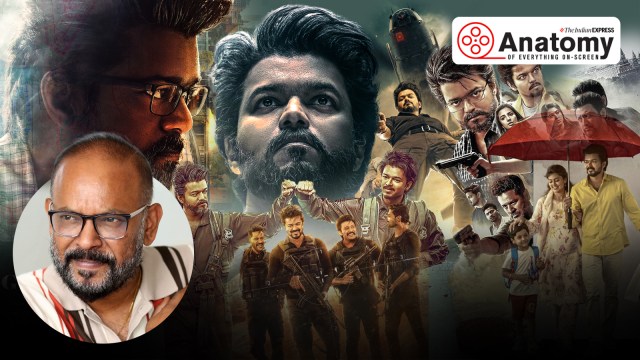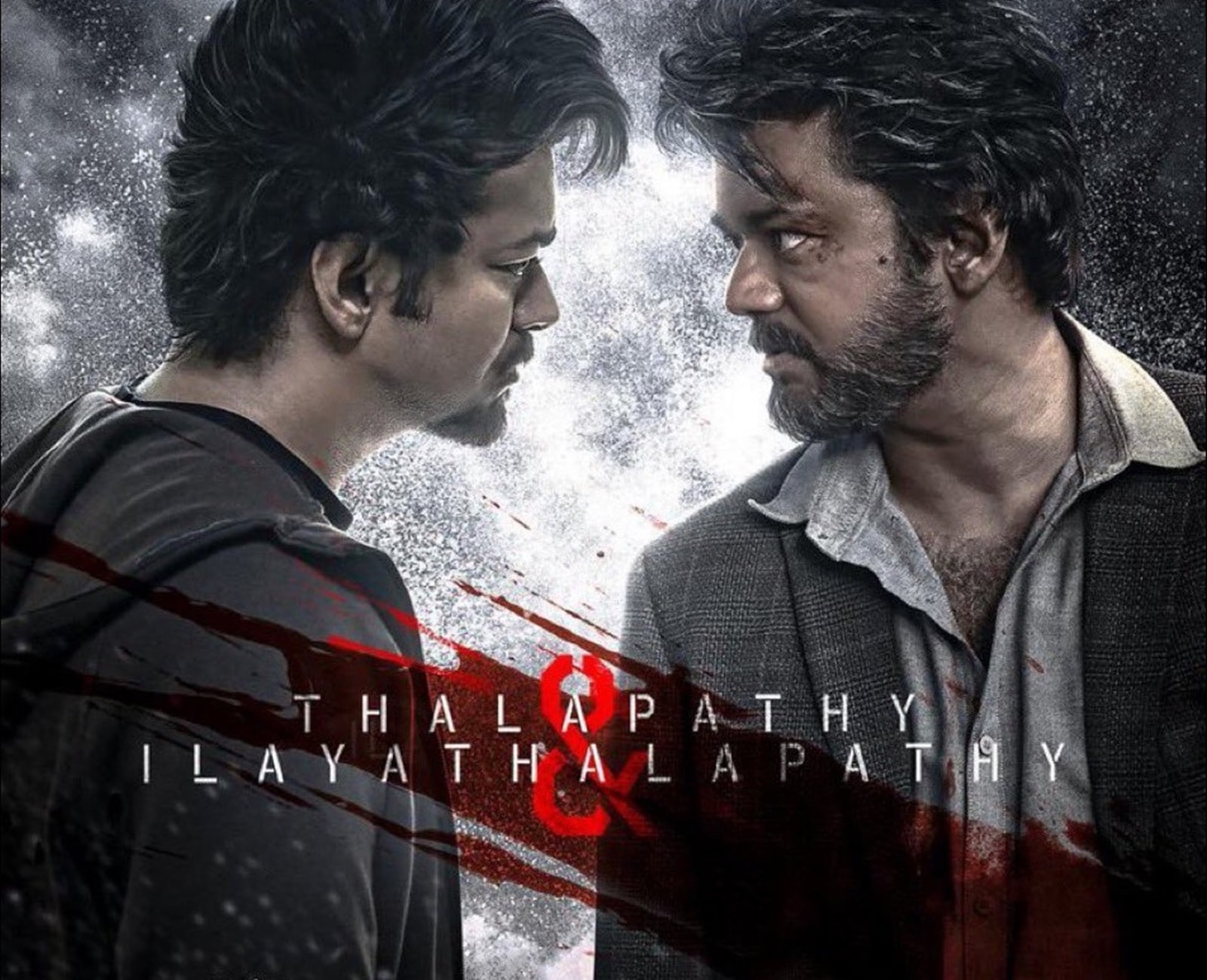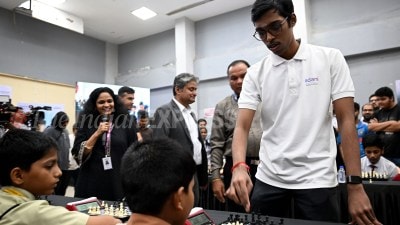While GOAT may not be the worst film in the careers of either Vijay or Prabhu, it certainly ranks among their weakest efforts and stands as one of the most costly duds in Indian cinema, second only to the Prabhas and Kriti Sanon-starrer Adipurush (2023). Right from the start, GOAT reveals itself as underdeveloped, both in its storytelling and technical execution.

Cinema Anatomy | Ranjith: The writer-director who peddled elitist, patriarchal and misogynistic ideas, now accused of sexual harassment
You know you’re in for a lacklustre experience when the film throws around grandiose terms like Special Anti-Terrorism Squad (SATS), uranium and treachery, but the presentation feels like a high school project by students who barely grasped the subject. The movie begins in Kenya in 2008, showing a train travelling through a desolate landscape, introducing the protagonist, MS Gandhi (Vijay), and others in the core group — Sunil (Prashanth), Kalyan (Prabhu Deva) and Ajay (Ajmal Ameer) — in the order of their star value, with their weapons and vehicles similarly determined by their status. Of all the ways Prabhu could have introduced the hero, he opted for the most bizarre approach: presenting him with a disguised face — wearing a mask of a young, late star Vijayakanth. Considering that he was resurrected through Artificial Intelligence (AI), making an actual Vijayakanth mask would have looked even better. The subpar VFX in the intro sequence itself is a significant letdown, particularly given the film’s substantial Rs 400 crore budget, which sharply reduces audience expectations.
A key aspect consistently prioritised by makers in Vijay films is ensuring his intro scene is the most exhilarating moment in the entire movie and directors like Lokesh Kanagaraj, Atlee and AR Murugadoss have set a high standard in this regard. However, in GOAT, Vijay’s intro falls short, failing to deliver the expected adrenaline rush even to his most ardent fans, primarily due to the poor setting of the scene that makes it look like a spy film in 144p and the botched “Vijayakanth resurrection” gimmick. Venkat Raajen’s overly amateur editing further hampers the sequence, which lacks cohesiveness, and Dilip Subbarayan’s uninspired action choreography provides only a little excitement.
Watch Thalapathy Vijay’s The Greatest of All Time – GOAT trailer here:
Following this underwhelming intro is the track “Whistle Podu,” which only adds to the disappointment, as the song fails to energise the audience or encourage them to break into dance, unlike the usual first singles in Vijay’s films. Unfortunately, throughout GOAT, maestro Yuvan Shankar Raja’s music lacks the vigour he typically brings, offering little substance to the overall experience.
After the lacklustre opening and a mediocre song, Prabhu takes us to Gandhi’s home, where, like all secret agent characters, he leads a double life. To the public and at home, Gandhi works as an employee at a tourism company to maintain his cover, but in reality, he’s one of the most adept SATS officers, highly skilled in combat. Predictably, his wife Anuradha (Sneha) only starts questioning his secretive behaviour once the film’s timeline begins, despite having lived with him for years.
Story continues below this ad
Only in Express | The Mammootty that KG George saw: A versatile actor, whose actions led to his mentor’s sudden exit from cinema
From this point on, GOAT relies on the formulaic comedy typical of any Vijay movie, with some ‘humorous’ bits feeling like they were pulled straight from WhatsApp forwards — such as the scene where his friends cover for him in front of Anu, explaining his absence from home the previous night. While it’s refreshing to see Vijay paired with a female actor from his generation — something most male superstars in India are scared to do — GOAT completely misses the opportunity to explore their chemistry, a factor that helped endear Kanagaraj’s Leo to many.
The film’s overreliance on nostalgia, with constant nods to earlier films and dialogues, both of Vijay and other artistes, begins right from the first act and only increases as the movie unfolds. It’s almost become a habit for directors working with superstars to include such callbacks, but what once felt charming has now become tiresome due to its overuse. GOAT also proves that filmmakers are increasingly relying on these throwbacks to fill the gaps in their films, offering audiences a high at the expense of other artists, instead of creating it organically within their movies itself.
 GOAT slowly reveals that the true battle is between Ilaya Thalapathy and Thalapathy, setting stage for a Vijay-vs-Vijay battle. (Image: AGS Entertainment/Facebook)
GOAT slowly reveals that the true battle is between Ilaya Thalapathy and Thalapathy, setting stage for a Vijay-vs-Vijay battle. (Image: AGS Entertainment/Facebook)
As with many typical spy films and series featuring a middle-aged hero, GOAT also presents the protagonist with a personal tragedy — in the form of his son Jeevan’s ‘death’. This occurs during a mission in Thailand, where Gandhi had brought his family, including a pregnant Anu, in an attempt to allay her suspicions. The shock of Jeevan’s death, combined with Anu’s discovery that Gandhi had been leading a double life, prompts her to leave him, taking their newborn daughter with her. While Jeevan’s death and Vijay’s emotional breakdown could have deeply resonated with audiences, the generic writing up to that point dulls its impact.
Story continues below this ad
Years later, Gandhi is working a desk job but still enjoys the support of his core team and his boss Nazeer (Jayaram). He has a strong bond with his daughter Jeevitha (Abhyukta Manikandan) too. Meanwhile, he embarks on a work trip to Moscow, where Gandhi encounters someone who resembles a younger version of himself, soon realising this person is none other than Jeevan (a de-aged Vijay). Gandhi brings Jeevan back home and they reunite with Anu and Jeevitha, finally beginning to live the life they had once envisioned. However, trouble gradually creeps in as their loved ones begin to die mysteriously, forcing Gandhi back into action. The audience, but not Gandhi, soon learns that the true battle is between Ilaya Thalapathy and Thalapathy, as Jeevan is the mastermind behind everything.
Must Read | ARM movie review: A landmark film in Tovino Thomas’ career
Though GOAT pulls off the Vijay-vs-Vijay vision more effectively than Azhagiya Tamizh Magan (2007), with better execution, the lack of originality in the writing and the heavy dependence on VFX, which failed to live up to the standards that Prabhu envisioned, detract from the few positives the film has to offer. While Vijay delivers commendable performances as both Gandhi and Jeevan, clearly striving to give his best for his fans before stepping away from cinema and moving into politics — as he has already announced, with only one film left after this — GOAT’s many shortcomings diminish his dedicated efforts. Another major drawback of GOAT is its excessive focus on the superstar. With two Vijays in the film, GOAT’s narrative seems torn between them, leaving the story underdeveloped and each incident half-cooked. By the way, what was the purpose behind naming him Gandhi? That will probably remain a perpetual mystery.
From Mission: Impossible movies and the Rajinikanth-starrer Padaiyappa (1999) to references like “Thala” Ajith, “Thala” Dhoni, the IPL team Chennai Super Kings and several of Vijay’s earlier films, GOAT slips in nostalgia wherever it deems necessary. However, these nods mostly feel awkwardly placed, as if the film is trying too hard to spark a reaction it is otherwise failing to evoke. Also, enough with Vijay’s chewing gum trick and the “I’m waiting” dialogue — it’s been a decade since these were first used. Honestly, they no longer excite the audiences as the makers think and instead provoke exasperated reactions of “not this again!” Most of the ‘twists’ that Prabhu likely thought would blow viewers’ minds, as he managed to do in Mankatha (2011), fall flat here, with Sunil’s ‘murder’ standing out as particularly juvenile. However, the writer deserves praise for not opting for a predictable redemption arc for Jeevan, allowing him to stay true to his villainous role till the end — and even beyond.
Story continues below this ad
Don’t Miss | Kishkindha Kandam movie review: Asif Ali, Aparna Balamurali-starrer is a brilliantly written, skillfully crafted mystery drama
Though the film attempts to deliver high-octane action scenes, the climactic face-off between the two Vijays is marred by subpar visual effects, with the background resembling flex banners used in school drama productions owing to the limited budgets the kids have (honestly, they would have done a better job). A couple of songs, including the Trisha track (which also injects nostalgia by referencing Vijay and Trisha’s 2004 hit Ghilli), feels misplaced, leaving one to wonder whether Prabhu even reviewed the final cut of the film before okaying it.
Following the film’s release, Prabhu speculated during an interaction with fans on X (formerly Twitter) Spaces that the film’s celebration of CSK might have been the reason the movie failed to connect with non-Tamil audiences, leading to poor business in Telugu and Hindi markets. However, if Prabhu intends to hone his craft, he might want to consider the reverse: beyond Vijay, the only thing that resonated with Tamil audiences was the CSK angle, because as a film, GOAT offers very little. Let’s hope that the upcoming Thalapathy 69 delivers the knockout experience fans are eagerly awaiting, especially since it’s billed as his final film.




 GOAT slowly reveals that the true battle is between Ilaya Thalapathy and Thalapathy, setting stage for a Vijay-vs-Vijay battle. (Image: AGS Entertainment/Facebook)
GOAT slowly reveals that the true battle is between Ilaya Thalapathy and Thalapathy, setting stage for a Vijay-vs-Vijay battle. (Image: AGS Entertainment/Facebook)































